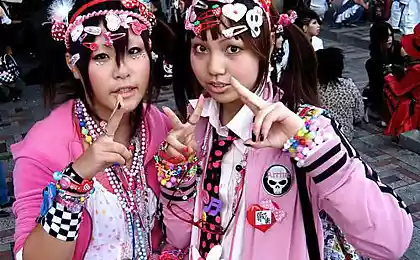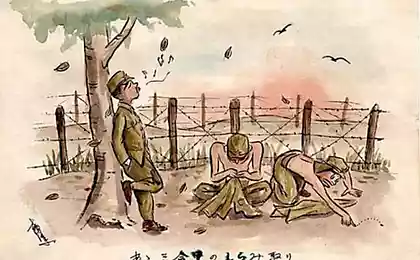305
How the Russian language sounds in the ears of attentive Japanese
People in the world are inherently the same everywhere, but at the same time they are different. What's the paradox? It probably depends on the mentality of the country, parenting patterns, national stereotypes and other such things. Americans and Russians, for example, find it difficult to find a common language, since the worldview of both is very different. The situation is even more interesting with East Asians. We'll tell you, How Russians live in Japan.
There they sometimes have a hard time, because the Japanese perceive the Russians in a special way. The indigenous people project some of their template ideas onto this nationality. And how they hear Russian - it's a separate subject. And only with a good sense of humor, in Japan you can survive and realize yourself in various areas of life.
39,950,000
What you read next will definitely make you smile, reader. You’ll be surprised, “This can’t happen!” Therefore, we specifically picked up reliable stories on the Internet with direct speech of real Japanese, our contemporaries. Only names were replaced in some places.
And that's where we couldn't pass by, not to draw your attention to the meaning of names in Japan. In parallel, we will mark them in brackets. It's really interesting!
Roads and bears Kayoshi (quiet), 24 years.
Kayoshi is very fond of Russian language and history. The guy studied spelling and grammar, learned even a few obscene words (it turns out that in most Japanese dictionaries and manuals in the Russian language mat takes place).
The meaning of the name characterizes Kayosha more than. He refuses to speak Russian with Russian speakers, as he is very shy. But he talks about Russians willingly. Look at how a modern Japanese person who studies Russian on his own represents Russians and Russia.

Russians are good-natured people, with a broad and kind soul. They only look so gloomy, and in life open and responsive.
Russians also value old equipment and other things, considering them more reliable, stronger and stronger. But you have to give them credit – they really produce a quality product. They have extraordinary ideas, and the original technology outpaces even China.
There is plenty of delicious food in Russia. Russians can eat a lot and plenty. They even have a word in everyday life - "to get drunk."
I also know that Russia has very bad, bumpy roads. And bears! (Not fools, but bears!)
To the question-joke: “Where are the bears, probably, on these roads?”, the Japanese calmly and seriously answers:
Sometimes they are on the streets, maybe.

This young man has his own motorcycle. His “iron horse” turned out to be a Russian “Ural” with a wheelchair. He boasted that he bought it in a specialty-bath shop, and not cheaply.
"It breaks very often," Kayoshi admitted, smiling to the ears (and that's a true Japanese habit: Japanese people always smile when they talk about problems). And you can see that the guy cherishes this motorcycle, does not regret buying it, because it was his dream.
About the life of Russians during the Soviet Union, three more Japanese, older in age (51, 53 and 57 years) told about their idea of the life of Russians. Over a couple of beers at the isakaya (a Japanese bar), they quickly become talkative. And they can tell the Russians how they used to live in the USSR.
Answers. Kazuki (beginning of a new generation, pleasant peace or radiance) iori (dependence) and juna We put it together because these three friends said almost the same thing. This is what they know about the lives of Russians in those years.
Each of the three is convinced that the Russians had to live terribly badly and poorly. This opinion has long been formed on the stereotypes instilled by propaganda. Yes, before it was actively fought against the Soviet Union.
Another stereotypical view. Russian winters are unbearably cold, fierce. And these harsh Russians, in order not to stiffen, drink a lot of strong drinks, and not at all drunken.

By the way, in stores in Japan it is easy to find Russian tinctures, as well as drinks with a higher degree.
At the same time, the Japanese unanimously admit and realize that in Soviet times nothing good was told about Russians on television. What they saw: men angry, rude, all in the same grey and black clothes, as well as fur hats. They carried a variety of military equipment, as most of them were military.
It was dark on the streets at night, even in the evening it was impossible to poke from the house: at every step I could wait for a setup. A person could just be taken from the street to a detention center and do something with him. Nobody knows if you're right or guilty.
“The streets are calmer now. And not as bad as the Soviets. Imagine only, there were no shops, and people were given food from cars, there were kilometer-long queues.
Another Japanese nodded in solidarity with a friend and went on to explain, "Well, yeah." Cars arrived, many people came with plates, mugs or banks, took the queue. They were given a little food there, bread, and drinks with a large degree were poured into mugs or metal cans. All this was shown on television in reports and programs about life in the USSR.”

About modern Russia Kazuko (harmonic child), 32 years old. The young woman was well aware of the modern reality in Russia. And yet...
“It is a strong and resource-rich country. But industry and agriculture are not very well developed. They buy everything from China, so they are cheaper. I saw it on TV.
And Russian women are very beautiful girls, among them many models. For example, Irina, the surname is difficult for me to pronounce (from the author: never said) - perfect as a doll. And there is such a nice figure skater Zagitova, she likes the Japanese, especially men. Yeah, and Sharapova's pretty, too.
On the Mores and Characters of Russians, or How Russians Behave in Japan Ken Ken Ken (healthy and strong), 27 years old, and yasu (calm girl), 23. Once again, the designation in brackets is just the meaning of the name in Japanese.
Ken speaks frankly about girls from Russia, his friend is modestly silent and, it seems, not confused.
Russian girls are so beautiful, with a beautiful figure and long legs. They emphasize this beauty, dress brightly and stylishly, wear tight-fitting clothes and opening neckline. Japanese women rarely dress! ?

Indeed, local women there go mostly in closed clothes, not particularly standing out. Russian women, like Europeans, can be seen from afar, even if they try to mimic the locals.
“And the Russians do not know how to hide emotions,” Yasu continues. They say what they think. Always be open, a little brazen and free.”
Here, their friends joined the young people and joined the conversation:
Yayoi. (Spring), 20 years: Russians in Japan are close and friendly, help each other in trouble. But not always! They smile a little and don’t trust strangers, but they are very friendly with those they know. We're a little bit alike: the Japanese don't smile at strangers either.
Akihiko (Bright Prince), 25 years: In Russia in winter a lot of snow, blizzards and blizzards. But not everywhere, the country is big. The local population can speak English, but for some reason does not like America and Americans. And the main thing I know about the Russians is that they are drinkers and drink very strong drinks.
Most Japanese believe that the Russian language sounds cute and very similar to cat meowing! After all, in Russian they often hear "-nya", and in Japanese the cat meows: "Nya-nya". And words like "me," "today," "vanya," ending in "-nya," sound like "kawaii."

And even more difficult for the Japanese are given the words from "-shka" and "-zhok": "girl", "matryoshka", "grandmother", "paper", "babayezhka". By the way, “grandfather” and “girlfriend” they hear almost the same and wonder.
This Japanese opinion of the Russians is very funny, right? They do not have enough information about modern life in Russia, and even more so about the USSR: what they know is mainly disinformation.
But let’s look at ourselves and be honest: is it not so stereotyped and stereotyped that we perceive people of other nations? Share your opinion and tell us what you know about how people live abroad.
There they sometimes have a hard time, because the Japanese perceive the Russians in a special way. The indigenous people project some of their template ideas onto this nationality. And how they hear Russian - it's a separate subject. And only with a good sense of humor, in Japan you can survive and realize yourself in various areas of life.
39,950,000
What you read next will definitely make you smile, reader. You’ll be surprised, “This can’t happen!” Therefore, we specifically picked up reliable stories on the Internet with direct speech of real Japanese, our contemporaries. Only names were replaced in some places.
And that's where we couldn't pass by, not to draw your attention to the meaning of names in Japan. In parallel, we will mark them in brackets. It's really interesting!
Roads and bears Kayoshi (quiet), 24 years.
Kayoshi is very fond of Russian language and history. The guy studied spelling and grammar, learned even a few obscene words (it turns out that in most Japanese dictionaries and manuals in the Russian language mat takes place).
The meaning of the name characterizes Kayosha more than. He refuses to speak Russian with Russian speakers, as he is very shy. But he talks about Russians willingly. Look at how a modern Japanese person who studies Russian on his own represents Russians and Russia.

Russians are good-natured people, with a broad and kind soul. They only look so gloomy, and in life open and responsive.
Russians also value old equipment and other things, considering them more reliable, stronger and stronger. But you have to give them credit – they really produce a quality product. They have extraordinary ideas, and the original technology outpaces even China.
There is plenty of delicious food in Russia. Russians can eat a lot and plenty. They even have a word in everyday life - "to get drunk."
I also know that Russia has very bad, bumpy roads. And bears! (Not fools, but bears!)
To the question-joke: “Where are the bears, probably, on these roads?”, the Japanese calmly and seriously answers:
Sometimes they are on the streets, maybe.

This young man has his own motorcycle. His “iron horse” turned out to be a Russian “Ural” with a wheelchair. He boasted that he bought it in a specialty-bath shop, and not cheaply.
"It breaks very often," Kayoshi admitted, smiling to the ears (and that's a true Japanese habit: Japanese people always smile when they talk about problems). And you can see that the guy cherishes this motorcycle, does not regret buying it, because it was his dream.
About the life of Russians during the Soviet Union, three more Japanese, older in age (51, 53 and 57 years) told about their idea of the life of Russians. Over a couple of beers at the isakaya (a Japanese bar), they quickly become talkative. And they can tell the Russians how they used to live in the USSR.
Answers. Kazuki (beginning of a new generation, pleasant peace or radiance) iori (dependence) and juna We put it together because these three friends said almost the same thing. This is what they know about the lives of Russians in those years.
Each of the three is convinced that the Russians had to live terribly badly and poorly. This opinion has long been formed on the stereotypes instilled by propaganda. Yes, before it was actively fought against the Soviet Union.
Another stereotypical view. Russian winters are unbearably cold, fierce. And these harsh Russians, in order not to stiffen, drink a lot of strong drinks, and not at all drunken.

By the way, in stores in Japan it is easy to find Russian tinctures, as well as drinks with a higher degree.
At the same time, the Japanese unanimously admit and realize that in Soviet times nothing good was told about Russians on television. What they saw: men angry, rude, all in the same grey and black clothes, as well as fur hats. They carried a variety of military equipment, as most of them were military.
It was dark on the streets at night, even in the evening it was impossible to poke from the house: at every step I could wait for a setup. A person could just be taken from the street to a detention center and do something with him. Nobody knows if you're right or guilty.
“The streets are calmer now. And not as bad as the Soviets. Imagine only, there were no shops, and people were given food from cars, there were kilometer-long queues.
Another Japanese nodded in solidarity with a friend and went on to explain, "Well, yeah." Cars arrived, many people came with plates, mugs or banks, took the queue. They were given a little food there, bread, and drinks with a large degree were poured into mugs or metal cans. All this was shown on television in reports and programs about life in the USSR.”

About modern Russia Kazuko (harmonic child), 32 years old. The young woman was well aware of the modern reality in Russia. And yet...
“It is a strong and resource-rich country. But industry and agriculture are not very well developed. They buy everything from China, so they are cheaper. I saw it on TV.
And Russian women are very beautiful girls, among them many models. For example, Irina, the surname is difficult for me to pronounce (from the author: never said) - perfect as a doll. And there is such a nice figure skater Zagitova, she likes the Japanese, especially men. Yeah, and Sharapova's pretty, too.
On the Mores and Characters of Russians, or How Russians Behave in Japan Ken Ken Ken (healthy and strong), 27 years old, and yasu (calm girl), 23. Once again, the designation in brackets is just the meaning of the name in Japanese.
Ken speaks frankly about girls from Russia, his friend is modestly silent and, it seems, not confused.
Russian girls are so beautiful, with a beautiful figure and long legs. They emphasize this beauty, dress brightly and stylishly, wear tight-fitting clothes and opening neckline. Japanese women rarely dress! ?

Indeed, local women there go mostly in closed clothes, not particularly standing out. Russian women, like Europeans, can be seen from afar, even if they try to mimic the locals.
“And the Russians do not know how to hide emotions,” Yasu continues. They say what they think. Always be open, a little brazen and free.”
Here, their friends joined the young people and joined the conversation:
Yayoi. (Spring), 20 years: Russians in Japan are close and friendly, help each other in trouble. But not always! They smile a little and don’t trust strangers, but they are very friendly with those they know. We're a little bit alike: the Japanese don't smile at strangers either.
Akihiko (Bright Prince), 25 years: In Russia in winter a lot of snow, blizzards and blizzards. But not everywhere, the country is big. The local population can speak English, but for some reason does not like America and Americans. And the main thing I know about the Russians is that they are drinkers and drink very strong drinks.
Most Japanese believe that the Russian language sounds cute and very similar to cat meowing! After all, in Russian they often hear "-nya", and in Japanese the cat meows: "Nya-nya". And words like "me," "today," "vanya," ending in "-nya," sound like "kawaii."

And even more difficult for the Japanese are given the words from "-shka" and "-zhok": "girl", "matryoshka", "grandmother", "paper", "babayezhka". By the way, “grandfather” and “girlfriend” they hear almost the same and wonder.
This Japanese opinion of the Russians is very funny, right? They do not have enough information about modern life in Russia, and even more so about the USSR: what they know is mainly disinformation.
But let’s look at ourselves and be honest: is it not so stereotyped and stereotyped that we perceive people of other nations? Share your opinion and tell us what you know about how people live abroad.
Grandfather wanted romance and he signed with a neighbor when grandmother was gone
The neighbor took the addition of cottage cheese casserole, although she switched to Spartan nutrition until spring.























